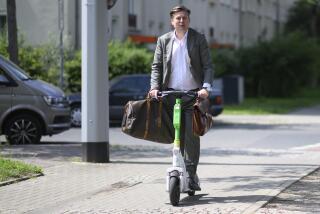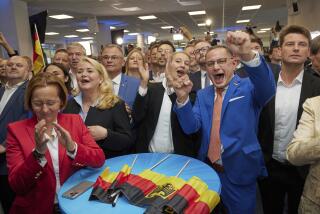Czechoslovaks Eagerly Stream to Polls : Eastern Europe: The first free elections in more than four decades mark the formal coup de grace to Communist rule.
- Share via
PRAGUE, Czechoslovakia — Ruzena Nemcova, 93, shuffled slowly up the steps to Vitezna Plan High School, her 25-year-old grandson supporting her with both hands. It was 20 minutes after the polls opened in Czechoslovakia on Friday, but Nemcova did not want to be late.
“Forty years,” she said. “Forty years and elections meant nothing. But this one is different.”
Others in the line made way for her to the front of the queue, and her grandson, Jan Bejcek, found a chair for her in the polling office, while the election officers checked her name off the rolls. Then Bejcek ushered her slowly to the curtained booth.
She was beaming when she came out.
Similar scenes were being played out all over Czechoslovakia on Friday, as the first of about 11.2 million registered voters streamed to the polls, despite rainy weather, to administer the formal coup de grace to the totalitarian Communist power that held sway here from 1946 until last November, when massive street demonstrations ousted the Communists from power.
Civic Forum, the umbrella organization that led last November’s movement, is expected to dominate the elections, along with its sister organization in Slovakia, called Public Against Violence. An alliance of Christian Democratic parties, which includes three separate groups, is also expected to run well. The Communists, pollsters say, could draw around 10% of the vote, much of it expected to come from small towns and the countryside.
Polls remained open until 11 p.m. and will reopen again today until 2 p.m. At least partial unofficial results are expected a few hours after the polls close today.
“We owe all this to Vaclav Havel and Charter 77,” said Jan Durec, 62, also voting shortly after the polls opened at the Vitezna Plan High School, in an old, working-class area of Prague. Havel, now president of Czechoslovakia (and virtually certain of being reelected by the new Parliament whose members were being chosen in this election) was one of the founders of the Charter 77 human rights organization in 1977, a group which formed the core of the opposition movement here until Civic Forum was born in November.
“I am very happy today,” Durec said, a comment widely echoed among other voters Friday. “I have been wanting this for 40 years, waiting for it all the time. If I were not a man, I would be crying now. We owe everything to Havel and Charter 77, who led this society to free elections.”
Durec said “everyone, absolutely everyone” of his friends were planning to vote, an assessment that supports the expectations of pollsters of a 90% turnout. “Everyone was looking forward to it.”
At stake are 300 seats in a new federal Parliament, as well as republican parliaments for the Czech and Slovak republics.
On the eve of the vote, the campaign, which had been conducted in an almost stately calm, flared with accusations of dirty tricks, with most of the accusations aimed at Civic Forum.
The People’s Party, one of three in the Christian Democratic Union, made an official complaint about charges that its leader had been a secret police agent. Josef Bartoncik, head of the People’s Party, met with Havel, who said only that he retained confidence in Jan Ruml, the deputy interior minister who made the accusation most recently, asserting in a television interview Wednesday that Bartoncik was “unfit to hold public office.”
Former Communist hard-line leader Milos Jakes, who, along with six other former Communist leaders was questioned by prosecutors for two days this week, said he was being used as a political football.
“It is part of various pre-election attempts to gain more votes,” Jakes complained.
Among those questioned was Jakes’ predecessor, Gustav Husak, who was among the prominent persons shown voting Friday on national television. He declined comment.
BACKGROUND
At stake in Czechoslovakia’s elections are 300 seats in the two-chamber national Parliament, or Federal Assembly, 200 seats in the regional parliament of the Czech republic and 150 seats in the regional parliament of the smaller Slovak republic. The Federal Assembly must draft a new Czechoslovak constitution and elect a president, virtually certain to be the incumbent, Vaclav Havel. The parties that are favored to lead are the Civic Forum and its Slovak partner organization, Public Against Violence, which led last winter’s peaceful revolution against Communist rule. A key issue is the status of Slovakia. Under the current federation created by the Communists in 1968, Slovakia is allotted half the federal funds, although it has only about one-third of Czechoslovakia’s 15.6 million citizens.
More to Read
Sign up for Essential California
The most important California stories and recommendations in your inbox every morning.
You may occasionally receive promotional content from the Los Angeles Times.













